The political crisis in Westminster has been a gift to the SNP government, which has exploited every Brexit twist and turn to push its case for independence.
On Monday morning, First Minister Nicola Sturgeon, appearing on Good Morning Britain, made the point again that Scotland had not voted to leave the EU.
Reminded by host Piers Morgan that Scotland was still part of the UK, which opted, narrowly, to Leave Europe, Sturgeon picked up her cue.
Had Scotland been independent, none of this would be happening and all would be rosy, or so the Nationalist mantra goes.
It is hard to refute a hypothetical, but there is plenty of evidence on which to judge the competence of the SNP, which has been in power for nearly 10 years.
Perhaps the party’s record in industry is the most telling indictment, because a separate Scotland would need to make things and create wealth in order to feed, house, educate and provide health and welfare to its population.
Recent events on the Clyde do not augur well for Sturgeon’s independence dream. The decision by her ministers to nationalise the struggling shipyard Ferguson Marine has been condemned as the act of a ‘banana republic’.
This is not the view of political opponents within Scotland who might have an axe to grind, but the reaction of industrialists, both Scottish and international.
First, Jim McColl, the Clyde Blowers Capital billionaire owner of the yard and one of the SNP’s biggest backers in business, warned that nationalisation would ‘damage the economy’.
It was McColl who rescued the yard shortly before the 2014 independence referendum in a move seen to have boosted then First Minister Alex Salmond’s campaign; he is also one of Sturgeon’s economic advisers.
Last month, McColl accused the SNP regime of ‘abusing its power’ in the way it had handled a contract to build two CalMac ferries.
The project, costing £97 million, is behind schedule and over budget, which McColl has blamed on ‘interference and disruption’ from the government agency CMAL that is buying the vessels. They deny the charge.
McColl said: ‘The way they are acting right now is economically damaging for the local economy and for Scotland.’
Now, even more scathing criticism has come from overseas, with the owner of Canadian shipyard Davie describing the SNP’s takeover of Ferguson Marine last month as ‘insanity’ and a ‘slow-motion car crash’ for Scotland.
The intervention of the SNP’s finance minister, Derek Mackay, would deter future foreign investment in Scotland and destroy the chances of the shipbuilder securing UK defence contracts, said Davie.
This is the kind of comment that might be hurled across the chamber in Holyrood, but the fact that it comes from one of North America’s biggest yards is embarrassing for Sturgeon, who likes to grandstand on the world stage.
The chair and CEO of the group that owns Davie, Alex Vicefield, reportedly said this week: ‘I don’t know anyone in their right mind who would think that nationalising a shipyard in 2019 in the western world is a good idea.
‘If a successful entrepreneur like Mr McColl can’t do it [save Ferguson], I can assure you a government won’t be able to do it. You only see government owned shipyards in banana republics.’
Alienating those with the necessary expertise spells disaster for Ferguson long-term, said the Canadians, who dealt with a similar dispute over a publicly financed ferry contract but resolved the matter, and ensured the survival of the yard, by calling in an independent expert.
There are 350 jobs at stake at Ferguson Marine, as well as the viability of a precious Scottish industry.
The ferries are not the only orders on the books at the Port Glasgow company; there has been something of a resurgence in boatbuilding in Scotland recently, with a burgeoning marine economy centred on the growing aquaculture, renewables and tourism sectors.
New boatbuilding courses have been set up – most recently at Argyll College – and boatbuilding modern apprenticeships established to meet the increasing demand from Scottish yards for skilled labour.
There are plans to develop facilities on the Clyde by other yards, such as the Glasgow based Malin Group, which announced a year ago its intention to base a marine technology hub at West Dunbartonshire.
The company’s managing director, John MacSween, said at the time that the heritage of the Clyde is ‘something we should be rightly proud of’, and it was important to guarantee the long term success of the area as a maritime centre of excellence.
If private investors are prepared to safeguard Scotland’s shipbuilding tradition, and all the earnings and employment that entails, then the government must do everything it can to champion them.
The SNP might think it is in its own interests to seize control of Ferguson Marine for political expediency, but no one seems to believe it is in Scotland’s interests.


